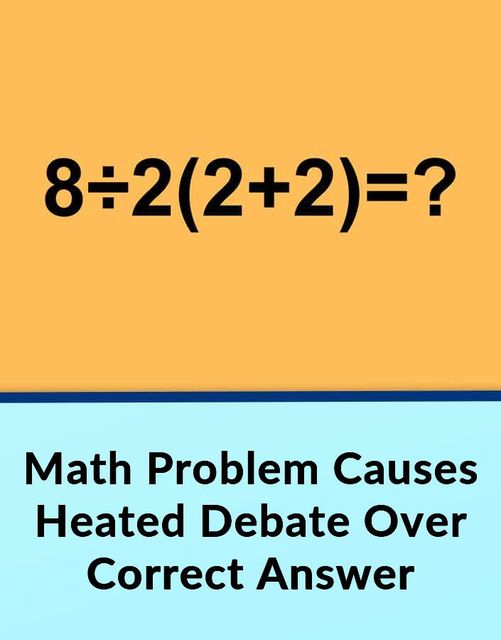Math Problem Causes Controversy As People Disagree How To Solve It![]() Check the 1st comment
Check the 1st comment![]()
The internet is filled with conundrums that have left many stumped and debating what the real answer is. Just like the infamous blue and black dress that took social media and even experts by storm, the same case can be said with a viral math problem that got workplaces and even scientists racking their brains out.
In a photo posted by a user in 2019 on Twitter, they asked their followers to solve a now-controversial mathematics problem – 8 ÷ 2(2 + 2) – which caused a full-blown debate not just on Twitter but also on social media.Editors of Popular Mechanics, a lifestyle magazine, were at a standstill as they were divided on the infamous math conundrum. Taking the conversation to their official workplace chatbox, the editors debated and decoded what the real answer to the question was.
According to one of the editors, the practical way as taught in elementary and high school, was to use the popular rule “PEMDAS” or “Parentheses, Exponents, Multiplication, Division, Addition, and Subtraction.” In this case, equations or problems should be solved in order of the operations that appear on the acronym – one must solve those in parentheses first, then exponents, and so on and so forth – from left to right.This meant that the 2 + 2 in the parenthesis should be solved first, which would give out 2, leaving people with 8 ÷ 2 x 4. After this, the equation calls for solving the leftmost operation first, as explained by Mashup Math, so that means 8 ÷ 2 must be solved first rather than 2 x 4 despite Multiplication taking precedence over Division.
The quotient would result in 4, which gives us 4 x 4, with a product of 16. However, half of the people online tend to disagree with this operation – including scientists who know their math.

The other half of Popular Mechanics editors said that the answer is 1. How did they arrive at this question? They also used “PEMDAS” but used a different interpretation of how it should be understood.
They agreed that the 2+2 in the parenthesis should be solved first, but the sum should be treated like it is in a parenthesis – 8÷2(4). One of the editors pointed out that based on the math class he had, a multiplication operation in parenthesis trumps division whether it is on the leftmost of the equation.
As the question siphoned the energy of the internet on the wild debate, mathematicians and scientists entered the battle. American Mathematical Society Public Awareness Office Mike Breen cited that based on the order of operations, 16 is the right answer.
However, he admitted that the equation, on the way it was written, is actually “ambiguous” in nature.
“In math, a lot of times, there are ambiguities. Mathematicians try to make rules as precise as possible. According to the strict order of operations, you’d get 16, but I wouldn’t hit someone on the wrist with a ruler if they said 1,” he said.
Despite Breen’s clear answer, some people are still unconvinced. The other half of the magazine editors sought the help of Physics Professor Rhett Allain from Southeastern Louisiana University, which they believed had finally solved the debate.
“This is convention. We have conventions on how to write these things, just like we have conventions on how to spell stuff. But still, there are different conventions. Some people spell it as ‘gray’ and others as ‘grey.’ We still understand what’s going on,” he clarified.
But for him, the question should have been correctly written like this 8/(2*(2+2)), which would yield the quotient of 1.

What do you think is the correct answer to the equation? Is it 1 or 16? Let us know what you think, and pass this on to your family, friends, and other loved ones to know what the real answer is!
Please scroll below for more stories .-)

